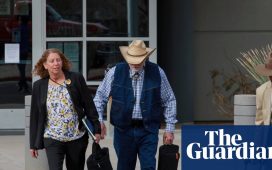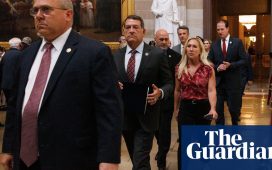Trump administration changes to US refugee policy are “tantamount to destroying the program”, according to experts, as the amount of people displaced worldwide continues to grow.
On Thursday, the administration announced it would set a refugee cap of 18,000 people for the fiscal year, which begins 1 October. It also issued an executive order allowing states or “local governments” to ban refugee resettlement.
In practice, experts warned, not only will fewer people be able to enter the US than ever before, but these decisions will pull apart the infrastructure that supports refugees when they arrive in the US. Families will therefore struggle to stay together.
Jen Smyers, the director of policy and advocacy at Church World Services, said the move was “tantamount to destroying the program”.
Advocates are especially concerned about 8,000 refugees who have been approved for travel to the US and may now have their journeys delayed or cancelled.
“This is actually the United States becoming a bad actor when it comes to refugee protection,” Smyers said. “This is the United States saying – during a time when the world is facing the largest displacement crisis in history – the US is going to roll up its mat and go home. It’s really astounding”
Senior US officials said on a call with reporters the cap was set so low because the administration is struggling to respond to the number of people seeking asylum at the southern border. In fact, the asylum program is distinct from the refugee program.
The Department of Homeland Security, with the justice department, oversees asylum applications. The state department oversees refugee resettlement. Both work with other agencies, including each other.
Smyers said the White House claim was a “bold-face lie”.
‘The US allowed me to send my kids safely to school’
Since the refugee system was formalized in 1980, the US has on average set an admission ceiling of 95,000 a year – though it often falls short of that cap. Even after 9/11, the US admitted about 27,100 refugees in 2002 and 28,000 in 2003.
Refugee resettlement is a slow process that involves the most intense scrutiny of any form of US immigration. On taking office, Donald Trump ordered a review of the vetting system, which the administration has since deemed secure.
Basma Alawee resettled in Orlando, Florida, in 2010, with her husband and young daughter. They had lived in Iraq through several wars but her husband’s work as a translator for the US military put their lives in danger.
Alawee said the new refugee cap was lower than she expected and she was worried for families waiting to be reunited with relatives.
“I really love this country because this country allowed me to practice my freedom, to speak freely, to practice my religion,” Alawee said. “It’s allowed me to have a home and send my kids safely to school and I want to see other people enjoying that too.”
Alawee, who trained as a chemical engineer, worked as a teacher in the US and became an activist after Trump implemented his travel ban on certain Muslim-majority nations. She is now the director of the We Are All America campaign in Florida, advocating for refugee rights, and the Florida delegate for the Refugee Congress.

She was pleased the refugee announcement included a specific mention of Iraqis, but was concerned about how low that figure was.
While the state department usually specifies how many refugees can come from regions such as Africa and the Middle East, the White House proposal made some unusual distinctions.
The government carved out 1,500 slots for people from El Salvador, Honduras and Guatemala. Last year, it admitted 502 from those countries, according to state figures.
There are 5,000 slots reserved for people fleeing religious persecution, though it is not clear how that determination is made. There are 4,000 spots for Iraqis who helped the US. At the end of July, more than 100,000 had applied, according to Reuters. The final 7,500 spots are for everyone else.
“I’m very concerned people interviewed and who are able to get on a plane right away will not be able to come based on these numbers,” said Jennifer Sime, the senior vice-president of US programs at the International Rescue Committee (IRC).
‘We used to be a beacon of hope’
Sime said that along with the lower ceiling, it will be harder for families to reunite if the order to allow states and “local governments” to ban refugees survives anticipated legal challenges.
Reunification has become more difficult because of the shrinking number of resettlement agency offices, which help refugees on things such as how to buy a home, find language courses or get a job.
More than 100 offices have closed down, according to Refugee Council USA, because there are too few people to process. More are expected to close.
When refugees flee their homes, family members often lose touch, putting their refugee applications on different timelines.
If a mother and child have arrived in Maine, for instance, and it suddenly stops allowing refugees, reunification will be delayed as the family tries to travel to another state to file the father’s application. The same could be true if Maine simply has to shut down resettlement agencies because not enough people are coming in.
Refugees have often lost family members and may form close ties with uncles, aunts, cousins and grandparents, but it is more difficult to get the government to prioritize reunification with such relatives. If parts of the country become islands for refugees, this will only get more complicated.
“What’s sad is I don’t think the US wants to be a world leader in refugee resettlement anymore,” Sime said.
“We used to be, and that used to be something people were proud of, that we were this beacon of hope and freedom for people who had been persecuted throughout the world, regardless of where they came from, and that is certainly not something this administration is interested in upholding.”






